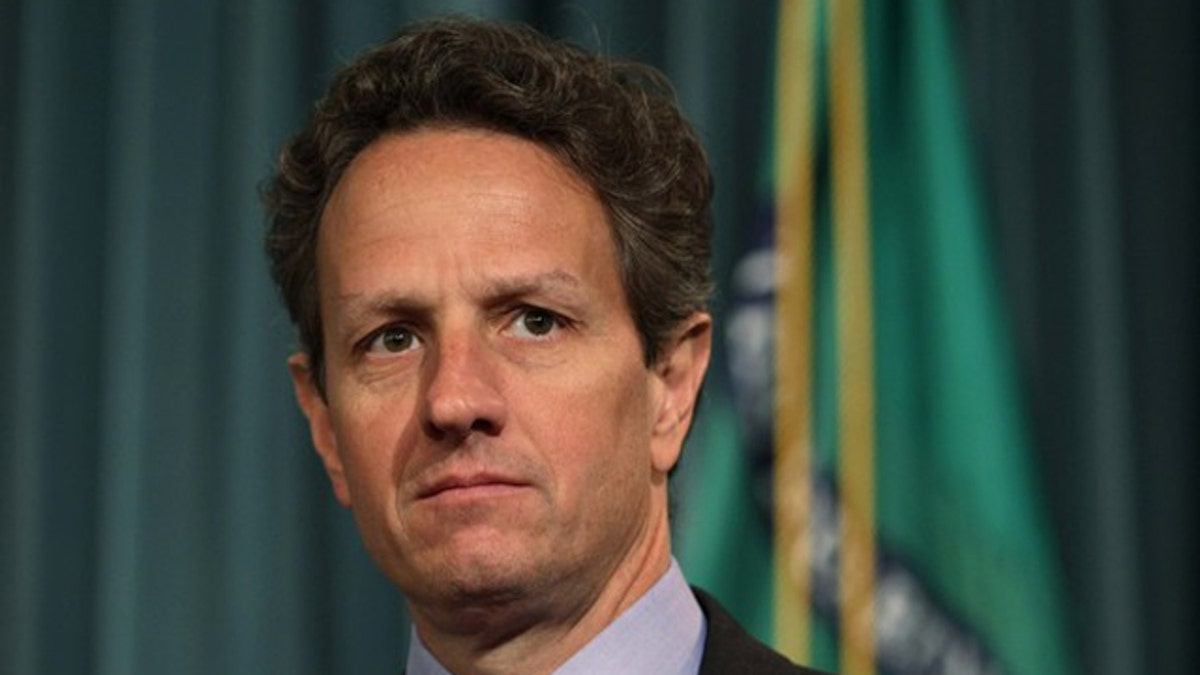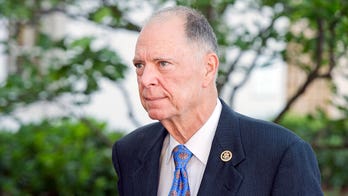
Treasury Secretary Timothy Geithner is pictured at a briefing at the Treasury Department in Washington May 13. (Reuters)
Uncle Sam is about to start borrowing from his nieces and nephews to stave off the immediate threat of default.
Treasury Secretary Tim Geithner has informed members of Congress that, with the U.S. government reaching its $14.3 trillion debt ceiling Monday, his department will have to turn to a string of last-resort measures so that the government can keep paying its bills. At the top of the list is a plan to suspend investments to two government employee retirement funds, while borrowing from one of them.
Geithner stressed that the move will not affect federal workers and retirees and that the accounts will be "made whole" once the debt limit is increased. But he ratcheted up his call for Congress to take action soon.
"I have written to Congress on previous occasions regarding the importance of timely action to increase the debt limit in order to protect the full faith and credit of the United States and avoid catastrophic economic consequences for citizens. I again urge Congress to act to increase the statutory debt limit as soon as possible," Geithner wrote in his letter to Congress Monday.
The soft debt-ceiling deadline comes and goes as lawmakers from both parties continue to meet with White House officials in hopes of reaching a deficit-reduction agreement. Both sides say they're ready to deal, but they disagree over how much and what to cut. Senate Republican Whip Jon Kyl, R-Ariz., told "Fox News Sunday" that lawmakers have reached agreement on "small-ball" areas, but "there's probably $2 trillion in savings that we've got to achieve in order to really get a handle on our out-of-control spending." Rep. Paul Ryan, R-Wis., author of Republicans' original budget proposal, was delivering an address on his ideas Monday afternoon.
Wherever the common ground lies, Geithner now estimates lawmakers have 11 weeks to find it. His department is predicting that it can hold off the possibility of default until a hard deadline of Aug. 2, but that if Congress fails to raise the debt ceiling by then the country could be thrown into a double-dip recession.
He and other administration officials have warned that Congress risks spooking investors and triggering higher interest rates across the board by flirting with the debt cap.
The administration has urged Congress to separate the debt ceiling vote from the push to extract long-term spending cuts. But several moderate Democrats joined Republicans in recent weeks in demanding budget reforms in exchange for a vote on the debt ceiling. The White House has since convened a series of meetings aimed at reaching an agreement.
Democrats are pushing hard for ending tax breaks for the biggest oil companies, a move estimated to bring in an extra $2 billion a year, but Republicans for the most part are shying away from anything that resembles a tax increase, calling instead for spending cuts only and entitlement reform.
While Obama has jacked up discretionary spending over the past two years, the growth in entitlement spending is driving the increase in the size of government in the long-term, now about 25 percent of GDP.
"Medicare, Medicaid, all -- everything should be on the table except raising taxes," House Speaker John Boehner told CBS' "Face the Nation."
Boehner on Monday reiterated a call to achieve spending cuts greater than the amount by which the debt limit is increased. "Half-measures and gimmicks won't get the job done, and tax hikes will only hurt job creation and do more damage to our economy," he said.
Boehner is backing an entitlement overhaul plan put forward by Ryan. That plan, part of the budget that passed the House, would over time replace direct Medicare payments to doctors with a system of subsidized insurance for seniors. Ryan plans to discuss his proposals Monday at the Economic Club of Chicago.
According to excerpts of the speech released in advance, Ryan will accuse political opponents of playing "class warfare." He argues that while his plan would make major changes to the country's social safety net, "Mounting debt also threatens our poorest and most vulnerable citizens, because those who depend most on government would be hit hardest by a fiscal crisis."
The Ryan plan, though, has run into some criticism from fellow Republicans. Former House Speaker Newt Gingrich, who last week launched his campaign for president, described the proposal as "right-wing social engineering" in an interview with NBC's "Meet the Press."
"I don't think imposing radical change from the right or the left is a very good way for a free society to operate. I think we need a national conversation to get to a better Medicare system with more choices for seniors, but there are specific things you can do," Gingrich said.
Boehner indicated there is room for negotiation, but said Senate Democrats first have to put a plan on the table.
Sen. Dick Durbin, D-Ill., reiterated on "Fox News Sunday" that while Democrats also want to cut spending, the debt ceiling must be raised.
"It's about the reputation of the United States and the economy. And if we play games with it or play politics with it, and default on our national debt, we could plunge this country back in a recession with even deeper unemployment. Nobody wants the see that happen," Durbin said.




